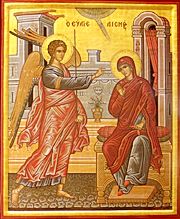Difference between revisions of "Annunciation"
m |
m (fixed link) |
||
| Line 1: | Line 1: | ||
[[Image:Annunciation.jpg|right|frame|The Annunciation to the Theotokos]] | [[Image:Annunciation.jpg|right|frame|The Annunciation to the Theotokos]] | ||
| − | The '''Annunciation''' (or Evangelismos in Greek) to the [[Theotokos]] is one of the [[Great Feasts]] of the [[Orthodox Church]], celebrated on [[March 25]]. Greeks also celebrate [[Greek Independence Day]] this day. This is one of only two days during [[Lent]], the other being [[Palm Sunday]], when fish is permitted. | + | The '''Annunciation''' (or Evangelismos in Greek) to the [[Theotokos]] is one of the [[Great Feasts]] of the [[Orthodox Church]], celebrated on [[March 25]]. Greeks also celebrate [[Greek Independence Day]] this day. This is one of only two days during [[Great Lent|Lent]], the other being [[Palm Sunday]], when fish is permitted. |
According to the [[Gospel of Luke]] 1:26-38, the [[Archangel Gabriel]] appeared to [[Theotokos|Mary]] to announce to her that she would conceive and bear a son, even though she "knew no man." According to holy tradition Mary had come home to her parents when she was only fifteen when she was visited by Gabriel. | According to the [[Gospel of Luke]] 1:26-38, the [[Archangel Gabriel]] appeared to [[Theotokos|Mary]] to announce to her that she would conceive and bear a son, even though she "knew no man." According to holy tradition Mary had come home to her parents when she was only fifteen when she was visited by Gabriel. | ||
Revision as of 17:18, August 9, 2005
The Annunciation (or Evangelismos in Greek) to the Theotokos is one of the Great Feasts of the Orthodox Church, celebrated on March 25. Greeks also celebrate Greek Independence Day this day. This is one of only two days during Lent, the other being Palm Sunday, when fish is permitted.
According to the Gospel of Luke 1:26-38, the Archangel Gabriel appeared to Mary to announce to her that she would conceive and bear a son, even though she "knew no man." According to holy tradition Mary had come home to her parents when she was only fifteen when she was visited by Gabriel.
This date was selected by the Church Fathers to be exactly nine months ahead of Christmas, indicating that Christ was conceived in perfection at that time "of the Holy Spirit and the Virgin Mary," as stated in the Nicene-Constantinopolitan Creed.
Many men and women in Greece are named for this event and celebrate their name day on this date.
- Greek: Evangelia (f) and Evangelos (m)
- English Evangelilne (f) and Evan and Angelo (m)
Greek Traditions
Many people make a pilgrimage as a special tribute to the Theotokos on the island of Tinos. Thousands of pilgrims jam the docks and city streets to visit the Church of Evangelistria (Tinos, Greece) that safeguards a miraculous healing icon of the Theotokos. Revealed in a vision, it was found buried in a field in 1823, and the church was built to house it. Pilgrims bring items of precious metals and other gifts to leave at the church. On August 15 (Dormition of the Theotokos) and March 25 the icon is carried through town in a grand procession.
